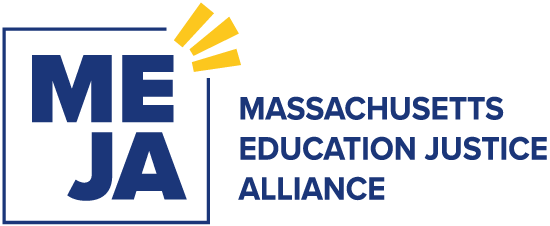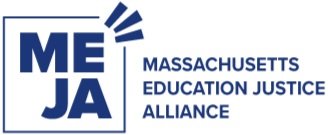Legislation Filed to Support Students by Ending Failed State Takeover System & High-Stakes Test-Based Graduation Requirement
‘Thrive Act’ Would Replace Top-Down, Harmful Policies With Student- and Community-Centered System of Assessment and Improvement
BOSTON – New legislation filed on Beacon Hill would replace the state’s failed approach to educational assessment and improvement, including the undemocratic state takeover system and the MCAS-based graduation requirement, with policies that will help all students to succeed and thrive. Instead of the current harmful and disruptive approach, the new legislation, known as the Thrive Act, would establish a modified graduation requirement based on coursework rather than high-stakes standardized testing, and implement a new ‘comprehensive support and improvement’ system designed to empower local communities to give students the tools and resources they need to succeed.
“State takeovers and high-stakes testing disrupt the education of low-income students while silencing the local democratic voice of communities of color,” said Vatsady Sivongxay, a public school parent and Executive Director of the Massachusetts Education Justice Alliance - Education Fund. “These failed measures are hurting students, denying parents a say in how their children’s schools operate, and increasing racial inequities in our schools, rather than fixing them. To help students, especially in high-poverty schools that have been most affected by the pandemic’s disruption, we need a better system that truly supports the well-being and future success of all students.”
Massachusetts is one of only eight states in the country that ties its standardized test to graduation, even though there is no correlation between a state having a graduation exam requirement and overall academic performance. The MCAS-based graduation requirement is especially detrimental to students with Individualized Education Plans, students learning English as a second language, students of color and students from groups that have been historically marginalized from an equitable and supportive education.
Under the Thrive Act, the modified graduation requirement would be based on the academic standards and curriculum frameworks for tenth graders in the areas of mathematics, science and technology, and English, and districts would additionally be able to include history, social science, and foreign languages in the requirements. Under the bill, coursework, as certified by the student’s district, would be the basis for showing mastery of the required skills, competencies and knowledge, rather than the current standardized test.
“Standardized multiple-choice tests don't demonstrate real-world mastery of skills, but they’re extremely good at measuring poverty. Our reliance on MCAS as a graduation requirement has created barriers to low-income students earning a high school diploma, forever hampering their futures. It's a dream killer," said Lisa Guisbond, Executive Director of Citizens for Public Schools. “A graduation requirement based on coursework will be more accurate and fair while better preparing students for the complex challenges of college or the workforce.”
“Our students deserve administrators who are not just looking at them as numbers, but as individuals with value that is not tied to their score on a test,” said Evan Baker, a Spanish teacher in the Southbridge School district. “We’re eight years into receivership, and not only have our MCAS scores not improved, but our students are being deprived of the education and support they need to succeed in the future due to acutely high staff turnover. We need a change.”
The Thrive Act would also replace the failed state takeover system with a ‘comprehensive support and improvement’ system that is rooted in local community input and evidence-based supports. Under current Massachusetts law, the state can choose to take full or partial control of any school or school district with low MCAS scores. The state can then privatize elements of the school or district, force out experienced educators, and make other disruptive changes. The law does not provide any clear pathway for schools or districts to exit state takeover, and no school or district that’s been taken over by the state has ever returned to local democratic control.
“Los estudiantes, padres y educadores en nuestra comunidad sabemos mejor que nadie lo que necesitan nuestras escuelas,” said Ysmael Rondon, a Lawrence parent of children ages 7, 12, and 13. “El estado no debería abusar de su poder y quitarnos el derecho a decidir lo que es mejor para nuestras escuelas; el control estatal sobre nuestras escuelas puede ser legal pero no es moral ni democrático.” [Translation: “Local students, parents, and educators in our community know best what our local schools need. The state should not abuse its power and take away our right to decide what is best for our schools; state control over our schools may be legal, but it is not moral or democratic.”]
Since the system was created in 2010, state takeover has exclusively targeted high-poverty school districts that predominantly serve low-income students and students of color. The three districts in state takeover (and a fourth which has undergone multiple state interventions) rank as the four districts with the highest percentages of low-income students in the state.
“We know from our experience in Boston that a misuse of and over-reliance on high stakes testing— which has been used in attempts to justify ineffective receivership schemes — harms school districts that disproportionately serve low-income students, and particularly harms districts that serve the highest numbers of Black, Latinx, and AAPI students,” said Boston Teachers Union (BTU) President Jessica Tang. “The Thrive Act will rectify many of the state’s failed, top-down, bureaucratic decision-making procedures. The Thrive Act will empower our communities and those who are closest to our schools to make decisions that will better enable our students and schools to thrive, especially once those community-based decisions are combined with increased local resources from the Student Opportunities Act and Fair Share Amendment.”
Southbridge (taken over in 2016) and Holyoke (taken over in 2015) are now the worst-performing and second-worst-performing school districts in the state, according to the state’s most recent district rankings. Following an initial uptick, Lawrence (taken over in 2011) has been on the decline and is now back in the lowest 6% of districts. Springfield, which has undergone multiple state interventions since 2010, is now the third-worst-performing school district in the state. And a group of individual schools that were taken over in 2013 have seen minimal to no improvement according to the state’s metrics, while experiencing programmatic disruption and alarming turnover of both educators and school leadership.
“This decade-long experiment has failed to address the racial, funding, and other inequities that are harming many students of color, and in fact, state takeover has put up additional barriers to their success,” said Suzanne Suliveras, President of the Lawrence Federation of Paraprofessionals. “High-need, high-poverty schools deserve comprehensive student focused support, guided by local democratic control. Not more top-down bureaucratic disruption with no record of success.”
“From creating a modified graduation requirement to replacing the state takeover system, this bill is about building supportive schools that empower students, educators, and families to thrive,” said Leon Smith, Executive Director of Citizens for Juvenile Justice. “This statewide campaign is focused on restoring community voice to our schools, supporting our students, and lifting up our local schools rather than tearing them down.” The legislation, An Act Empowering Students and Schools To Thrive, or the Thrive Act, is sponsored by State Representatives Jim Hawkins and Sam Montaño in the House (HD.3162) and State Senators Adam Gomez, Jo Comerford, and Liz Miranda in the Senate (SD.2067). The bill would:
• Implement a ‘comprehensive support and improvement’ system that focuses on giving students and educators the tools and resources they need to succeed, while ending the existing state takeover system.
• Give students, parents, educators, and local communities a real voice in how their schools are run.
• Require local plans to tackle the root causes of education disparities, including racial inequalities.
• Create clear pathways for improvement, including the funding necessary to support evidence-based programs, supports, and interventions.
• Establish a modified graduation requirement based on coursework rather than standardized testing.
• Establish a commission to study and make recommendations for a more authentic and accurate system for assessing students, schools and school districts, including strategies that would require changes in federal law.
• Maintain MCAS assessments and related reporting and accountability requirements to the extent mandated by federal law. The bill’s proposed ‘comprehensive support and improvement” system is also fully compliant with federal education law.
“The state’s takeover policies have proven to be controversial and ineffective for over ten years now,” said State Senator Adam Gomez. “The best way we can help our schools in receivership is to give back local control to school districts who truly know what their students need. Further, eliminating MCAS as a graduation requirement will ensure that a student’s future is not determined on the basis of a single test. Students of high need, residing in low income areas, and those who speak a first language other than English suffer the greatest from the MCAS graduation requirement. Through this legislation all students will have a fair and equitable chance to graduate high school on their own terms and hard work.”
“The high-stakes nature of the MCAS demonstrates and perpetuates inequities in our education system,” said State Senator Jo Comerford. “While I support regular student assessments, the Commonwealth is among a dwindling number of states that ties graduation to passing a test. We should listen to thousands of educators, school staff and caregivers across the Commonwealth and stop making this one test the ultimate judge of educational achievement.”
“Time and time again, we see receivership efforts targeted in communities of color who’ve experienced decades of disinvestment in our public education system,” said State Senator Liz Miranda. “At a time when we should be strengthening classroom-to-community education, investing more in social and emotional support services, and tackling the root cause of disparities, there has never been a more important time to replace the anti-democratic state takeover system with evidence-based interventions.”
“As a former public school teacher, I certainly value holding schools accountable for educating our state’s children and preparing them for a successful future. The MCAS have missed the mark; these lengthy exams are not an accurate measure of student preparedness and it’s time we recognize that and make change,” said State Representative Jim Hawkins. “A flawed system of testing should never lead to a school district takeover by the state, and while there is a valid argument for graduation requirements, the MCAS are failing our students and our educators. I am proud of the work being done in districts like my own to create performance-based assessments through group work and projects to truly measure the full potential of all students.”
“We know students learn best and are most supported when they have consistency and stability in their lives,” said State Representative Sam Montaño. “Receivership upends all that and has not been shown to have systemic impacts that benefit student learning. This legislation will prevent outside forces from coming in on high and instead support the build up and longevity of community collaboration to invest in our youth.”
###
The Massachusetts Education Justice Alliance - Education Fund is made up of Massachusetts students, parents, educators, school and college staff, and education advocates with a shared vision: that all students, regardless of income, race, gender, identity, religion, birthplace, or abilities, have access to high-quality, equitable, and democratically controlled public education that addresses the educational needs of the whole student and where every student thrives to reach their full potential. Learn more at massedjustice.org.

